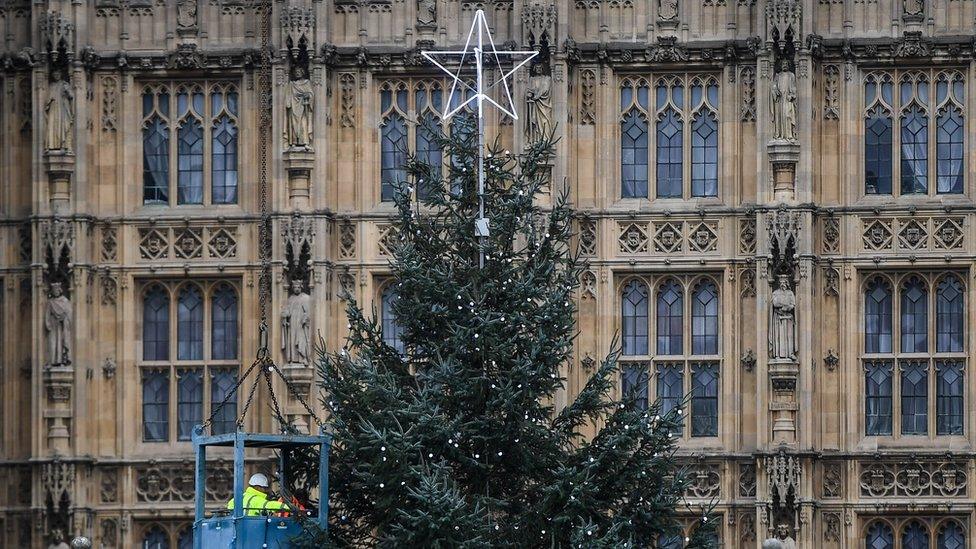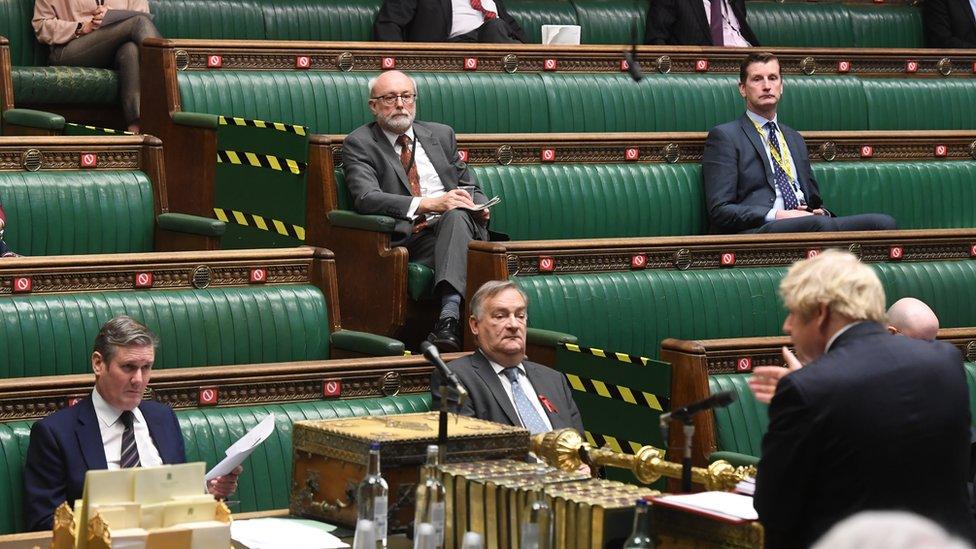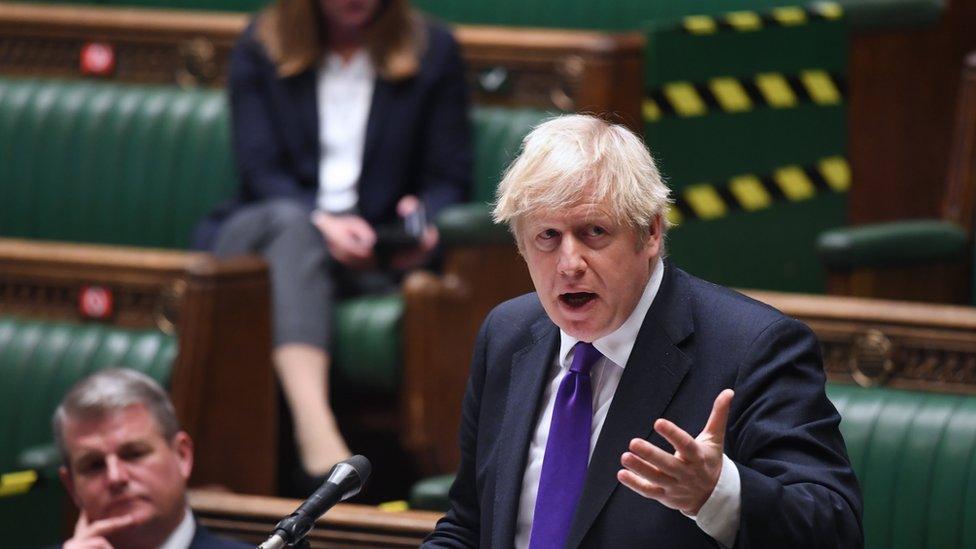The week ahead in Parliament
- Published

Brace yourself for a parliamentary stand-off.
Much of the action in the Lords and the Commons this week will revolve around the UK Internal Market Bill, where the government is pledged to reverse extensive changes made by peers.
(This is the bill which contains measures that overrule parts of the withdrawal agreement signed with the EU last year.)
Normally, peers gracefully hoist the white flag, if MPs don't accept amendments they've made to legislation; but this time, the controversial law-breaking powers in the bill looks set to galvanise them into resistance.
On Monday, the government majority in the Commons will vote to reject the Lords amendments; on Wednesday peers may put them, or a version of them, back in again, and on Thursday MPs will take them out for a second time.
This could go on for some time. (Remember, a bill has to be approved by both houses, before it can become law.)
And the same arguments will probably be reprised with this week's other big measure, the Taxation (Post Transition Period) Bill, where the same law-breaking issues are said apply - although, because its a money bill, the Lords can't amend it.
All this takes place against the background of the post-Brexit trade talks.
Both the government and the opposition seem to be operating on the assumption that there will be some kind of agreement, which could mean a parliamentary vote on the resulting treaty under the CRAG (Constitutional Reform and Governance Act) process, and many more votes on the legislation needed to implement it.
Given the rather shaky cohesion of the government's Commons troops at the moment, and the continuing resistance to pretty well everything it does in the Lords, this could get interesting.
And there are a couple more Westminster sub-plots...
Hard to get? The hot new Westminster trend seems to be cabinet ministers declining to appear before their select committees. First the Treasury Committee's Mel Stride, then International Trade's Angus Brendan McNeil and then the BEIS Committee's Darren Jones have written letters to chide their respective cabinet ministers for refusing to appear before assorted inquiries - or failing to reply to invitations
On the naughty step: one minister who will be giving evidence is Ed Argar, summoned before the Procedure Committee on Monday (16:00) to explain the Department of Health's performance in answering MPs' questions. Committee member Chris Chope has repeatedly complained to the Speaker, and will doubtless be sharpening his questions as I write... watch out, Ed.
Here's my rundown of the week ahead - but it comes with a couple of health warnings: ministerial statements may be signalled well in advance, as with the Chancellor's Spending Review statement, but equally, they can be added to the agenda at very short notice.
Urgent questions are normally agreed on the day, by the Speaker. And depending on the extent of what has to be discussed, they can displace or push back the scheduled business.
Monday 7 December
The Commons week opens (14:30) with an hour of defence questions - after which, expect the usual post-weekend quota of ministerial statements or urgent questions (it's a rare Monday that passes without at least one).
The main business is round one of what could prove to be an extended hour of parliamentary ping pong, the government's counter-blast to the seven amendments passed by the Lords to the UK Internal Market Bill.
In Westminster Hall (16:30) the Petitions Committee has scheduled a debate on e-petition 300027, external, which calls on the government to fund research for childhood cancers with the worst survival rates. It attracted 109,176 signatures.
That is followed (18:00) by a debate on two e-petitions on the ramifications of the pandemic for schools: e-petition 326066, calls for the government to cancel GCSEs and A-levels in 2021, because students will have lost six months of normal schooling - it was signed by 168,778 people; e-petition 550846, calls for the government to re-close schools and colleges due to the increase in COVID-19 cases. It attracted 415,420 signatures.
On the committee corridor, Public Accounts (14:30) recalls officials from the Ministry of Housing, including senior civil servant Jeremy Pocklington to follow up issues including Towns Fund (and the possibility of similar issues arising with the new Levelling Up Fund) and the priorities from the recent Spending Review.
Housing, Communities and Local Government (16:00) has a session on the future of the planning system in England with minister Christopher Pincher. Will there be any glimpses of the government's response to the backlash against its reform proposals from some Conservative MPs?
In the Lords (13:00) ministers will be questioned by Admiral Lord West of Spithead on whether a new UK warhead is required to extend the life of the Trident nuclear missile system to 2049.
And there will also be a questions on the consequences of government policies to tackle the pandemic for social mobility in England, from the Big Issue founder, Lord Bird.
Then peers turn to the first day of report stage consideration of a key Brexit bill, the Trade Bill - which has seen several incarnations and has had a rather stop-start passage through Parliament.
There is an array of big cross party amendments on issues like parliamentary approval system for future trade agreements - always a harbinger of trouble for the government.
And there's an amendment from former Northern Ireland Secretary Lord Hain on safeguarding the Northern Ireland protocol.
Tuesday 8 December
Proceedings in the Commons kick off (11:30) with and hour of Justice questions.
The day's Ten Minute Rule Bill from former Welsh Secretary Alun Cairns is on transparency at the BBC - a requirement for publishing more financial data.
Then MPs turn to a Ways and Means Resolution - a resolution to give consent to tax changes - to pave the way for the as yet unseen Taxation (Post Transition Period) Bill, which will be considered on Wednesday.
The resolution limits the scope of the bill, so that it can't be amended to increase other taxes. In this case, the bill seems mainly to be about VAT and post-Brexit customs duties.
The day's committee action will include Public Administration and Constitutional Affairs (14:15) quizzing the Lord Chancellor, Robert Buckland on the government's Constitution, Democracy and Rights Commission.
In the wake of the government announcement of its Agriculture Transition Plan, the Environment, Food and Rural Affairs Committee (14:30) will hold a wide ranging session with the secretary of state, George Eustice, covering post-transition-period food supply, fisheries negotiations and the impact of possible border disruptions.
Defence (10:30) has its annual look at the MoD Annual Report and Accounts 2019-20, with continuing concerns about whether it has the money to pay for its equipment programmes and other commitments.
International Development (14:30) will scrutinise the reduction to the aid budget from 0.7% to 0.5% of GNI, with evidence from the development sector, before hearing from the foreign secretary in January.
In the Lords (12:00) questions to ministers range across the strategy on heating of housing; linguistic, cultural and digital issues with the public health information on the Covid-19 pandemic and the partnership between Netflix and the British Board of Film Classification to establish age ratings for streaming platforms.
Then peers deal with two sets of regulations: first the Public Health (Coronavirus) (Protection from Eviction and Taking Control of Goods) (England) Regulations. This puts into law the ban on most evictions during the pandemic, which had previously been enforced through guidance to bailiffs. It has some exceptions, including cases involving trespassers, serious anti-social behaviour, domestic abuse, or substantial rent arrears that predate the pandemic. The Big Issue founder Lord Bird has a regret motion down, arguing the regulations do not protect people sufficiently during the pandemic.
Next are the REACH etc. (Amendment etc.) (EU Exit) Regulations 2020 - these aim to ensure the UK meets its obligations under the Protocol on Northern Ireland under the EU Registration, Evaluation, Authorisation and Restriction of Chemicals ("REACH"), regulations. Once again there's a regret motion down.
And, finally, peers continue the report stage consideration of the High Speed Rail (West Midlands-Crewe) Bill.
Wednesday 9 December
The Commons opens (11:30) with half an hour of Scotland questions, followed, at noon by Prime Minister's Questions.
There's an important Ten Minute Rule Bill from Labour's Dame Diana Johnson, to criminalise paying for sex and decriminalise selling sex. It would also create offences around enabling or profiting from another person's sexual exploitation.

Boris Johnson was in the chamber for last week's PMQs, after his period of self-isolation ended
The main legislative action will be the second reading and committee stages of the Taxation (Post Transition Period) Bill, which contains more powers to break the legal requirements of the UK's withdrawal agreement around the customs border with the Irish Republic.
Because the bill only goes as far as committee stage, the door is still ajar for final amendments, perhaps dealing with something in a trade/future relationship deal, in the following week - remember, the bill can't be amended later, in the Lords.
In Westminster Hall (09:30) the Labour MP Dan Carden leads a debate on the National Audit Office report on government procurement during the pandemic, external, and there's a debate on government policy on Iran (14:30) which may provide a platform for the substantial lobby of Conservative MPs, who believe the current line is too soft.
On the committee corridor, Women and Equalities (14:30) hear more witnesses in its inquiry into body image.
The dynamic duo, Sir Patrick Vallance and Chris Whitty, are back before the joint inquiry by Health and Science and Technology on Coronavirus: lessons learned (09:30).
In the Lords (12:00), ministers face questions on the prominence of public broadcasting, the review the Community Resilience Development Framework in the light of the COVID-19 and the review of gambling legislation.
And after that, in anticipation of robust pushback from the government on the United Kingdom Internal Market Bill, time has been allocated to consider Commons amendments. This could be round two of "parliamentary ping-pong", because there is every indication that a majority of peers are in no mood to back down.
Thursday 10 December
MPs begin (09:30) with 40 minutes of Digital, Culture Media and Sport questions, followed by a mini-question time for the Attorney-General. Then comes the weekly Commons Business Statement from the Leader of the House.
Next, the government has pencilled in round three of ping-pong on the UK Internal Market Bill - the Commons vote on the Lords reply to the Commons' (expected) rejection of their amendments.
That will be followed by a general debate on the future of the High Street.
It's a busier than usual Thursday on the committee corridor, where the Committee on the Future Relationship with the European Union hears evidence (09:30) on the latest state of play in the negotiations with the EU.
Public Accounts (10:00) looks at Covid-19: Government procurement, and contracts for PPE, and Public Administration and Constitutional Affairs (14:00) focuses on the work of the Cabinet Office, with Michael Gove.
In the Lords (12:00), questions cover the issue of a solution for war widows required to surrender that pension due to marriage or cohabitation; plans to participate in the United Nations' International Human Rights Day and the target for carbon neutral homes by 2050.
The main business is a major set of Brexit regulations, the snappily-titled Immigration and Social Security Co-ordination (EU Withdrawal) Act 2020 (Consequential, Saving, Transitional and Transitory Provisions) (EU Exit) Regulations 2020 - Brexit means significant change to UK immigration law, and this order reshapes primary and secondary legislation to take account of the ending of free movement.
Neither House will sit on Friday 11 December.
- Published30 December 2020

- Published27 November 2020
- Published2 December 2020

